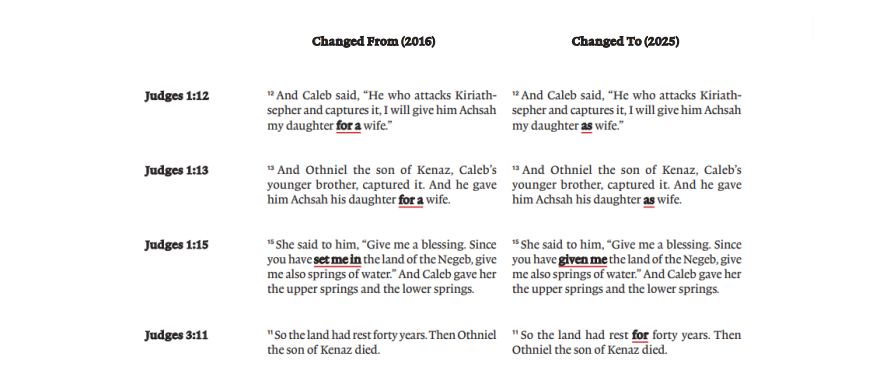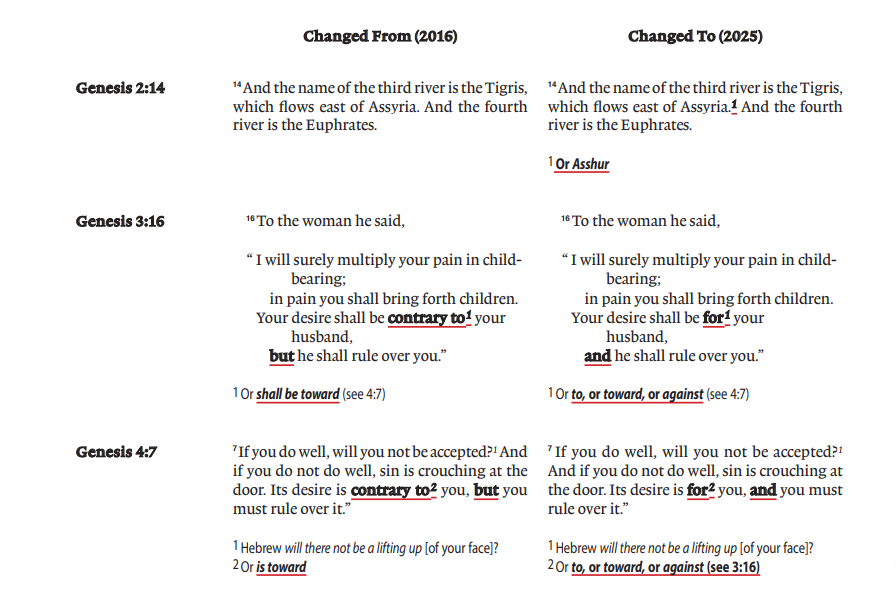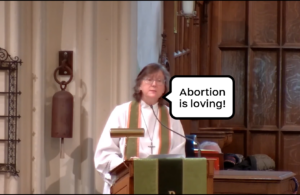In a bit of news that will make King James Version Only (KJVO) adherents strut and crow across social media for the next few days, Crossway has announced that The English Standard Version (ESV) Bible has been updated for 2025, with a press release revealing that the Translation Oversight Committee made changes to “36 Scripture passages involving 42 verses, resulting in a total of 68-word changes.”
Released by Crossway in 2001 and now with 315 million copies in print, the version has become especially prominent in Reformed circles thanks in no small part to robust and aggressive marketing efforts that have made great strides in a crowded market.
The release notes that while the translators are “committed to maintaining a faithful, stable, and standard ESV Bible text that will meet the reading, memorizing, preaching, and liturgical needs of Christians worldwide,” they also want to be “open to considering changes that improve accuracy and clarity, taking into account new archaeological, linguistic, and textual discoveries.” The previous revision took place in 2016. (It was also updated in 2007 and 2011) making this the fourth revision in nearly 25 years.
Most of the changes are relatively minor, including modifications to word order or footnotes that look to alter the spelling of words.

However, some changes have been significant, with the translators noting two:
One notable revision in this update involves Genesis 3:16 and 4:7. The committee changed the ESV 2016 translation of the Hebrew preposition ‘el from “contrary to” back to the original ESV 2001 translation “for” —which provides a more natural translation in continuity with the historic stream of formal equivalent English Bible translations (for example, the RSV, NASB, and NKJV), and which preserves the range of interpretive options in the Hebrew. The interpretive options can now be seen in the alternative renderings provided in the footnotes: “Or to, or toward, or against.” The conjunction “but” has been changed to “and” in Genesis 3:16 and 4:7 so as not to impose a contrast that is not explicit in the Hebrew text.
Another notable update appears in John 1:18. “The only God” has been updated to “God the only Son,” with “God” corresponding to theos and “only Son” to monogenēs (as in John 1:14). This translation incorporates the concept of descent (which is an implication of monogenēs in context) and maintains concordance with the other occurrences of monogenēs in the New Testament. The idea of sonship is evoked by monogenēs in the context of “Father” in John 1:18 and 1:14. The rendering “only son” for monogenēs in several ancient translations of the New Testament for Luke 7:12, 8:42, and Hebrews 11:17 indicates the propriety of a similar rendering in the verses referring to the Son of God. The footnote for John 1:18 has also been revised to reflect more clearly the manuscript variations, including alternative renderings such as “the only God who” and “the only Son,” allowing readers to engage with the full textual tradition.

Given that there are 540 different editions of ESVs in print, Crossway anticipates the rollout of the text will take nearly two years to complete.























11 responses to “2025 ESV Bible Update Makes 68 Changes, Including Significant Edit to Genesis”
Translation is a very hard and difficult work for sure… as a Roman Catholic I made the personal decision to just stick with the time tested Duay Reheims BIble. if I were a protestant I’d stick to the KJV.
Makes sense. I’m Protestant but I bought a St. Joseph’s Sunday Missal to see what passages Vatican II Catholics are reading in the Novus Ordo, and when I saw that the US missals use the NABRE (ew gross!) I ordered the Canadian missal because the NRSV is a little better.
textus Receptus
This is why I use the NIV2011 as my modern translation along with my KJV. ESV is unstable, not only in constanlty changing, but also in many places pretends to be the KJV rather than a fully modern translation. ESV is based on the RSV and you’re giving royalty money to the WOKE National Council of Churches when you buy it. You might as well just go straight RSV, or RSV2CE (2nd Catholic Edition), if want an RSV-based Bible (that will give the wokies royalties too though). Because the ESV ain’t that different from the RSV. The NIV2011 also follows more xurrent textual criticism in places and has WAY better footnotes on text critical issues. The ESV is not a real improvement over the Rsv and so FAILS in what it was even supposed to do. ESV was also supposed to shun gender inclusive language orihinally but DID NOT. The silly Baptists who switched to ESV because they were upset that the NIV2011 introduced some gender neutral stuff over the NIV84, LOL!!!! ESV is MUCH worse on that. Might as well use an NRSV as an ESV because ESV is just as gender neutralized as the NRSV, sorry to say. AND for a Textus Receptus enjoyer like myself, NIV justifies its removal of verses with footnotes so I can generally tell when a verse is removed, whereas the ESV just silently removes them like a deceiver.
Ironic that the heading of the article is a swipe at people that hold to the KJ.
Definitely shows the rebellious nature (fruits) of these people. 💡
First rule in the vast variety of versions produced is that the King James Bible is ALWAYS wrong… Thousands of different and disagreeing versions are right.
Interestingly, these updates aproximate to the Portuguese translation. Most English readers seem to forget English is not “the inspired” translation… 😉
The real issue is not the specific changes. They’ve changed some of these passages back and forth over the years. But then they put out a text they called the “final text” and now they’re changing it again. So much for their promise to not make any more changes.
The fact that ESV (and other abominations) changes things loads and loads of times is a testament that KJB-1611 IS The True Word for the Anglo-Saxons.
Everything else is but a goyslop peddled by the Synagogue of Satan to pervert the Word.
The term μονογεης does not, in and of itself, constitute a rendering of “only *son*”. In fact, the antecedent of the term in Luke 8:42 is θυγάτηρ (daughter). So, the adjective is simply attributing the quality of uniqueness or one-of-a-kindness, and therefore is rendered “only/one and only”.
Usually, υιος (son) is present in the text and is the noun being modified. However, in the case of John 1:18, the textual issue raises a level of ambiguity, and the earliest mss with the best coherence in attestation read θεος. Therefore, Crossway’s rendering of “God the only Son” seems to be an interpretative choice, attempting to incorporate both elements of the textual variant.
Make money online from home extra cash more than 18000 to 21000 Dollars. Start getting paid every month Thousands Dollars online. I have received 26000 Dollars in this month by just working online from home in my part time. every person easily do this job by. https://midly.in/SxrIuV